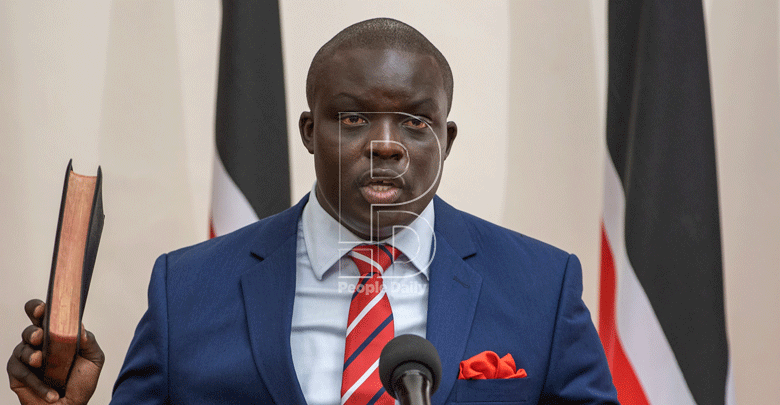CAS post: Political masterstroke or a legal blunder?

Noah Cheploen @cheploennoah
Three years ago, President Uhuru Kenyatta surprised many when he created the position of Chief Administrative Secretary (CAS), with some activists rushing to court to challenge its constitutionality.
Activist Okiya Omtata filed an unsuccessful suit in the High Court, claiming the position was created without public participation as required by the law.
Having appointed ‘technocrats’ and three politicians who had assured him that they would not dabble in politics in his first term, Uhuru, in his second term, seemed to have seen a gap in the Cabinet that needed to be filled.
The 2010 Constitution removed the position of assistant minister and capped the number of Cabinet Secretaries at 22, thus limiting the President’s capacity to reward loyalists and election losers.
But on January 26, 2018 the President announced the creation of the position, which in effect would be the equivalent of an assistant minister.
“I have decided to establish a new position in government, the position of Chief Administrative Secretary, in all our ministries,” he said.
“The Chief Administrative Secretary would broadly be responsible for helping the Cabinet Secretary to better coordinate the running of the affairs of their respective ministries,” he said.
In pecking order, a CAS ranks below the Cabinet Secretary and above the Principal Secretary.
But in his suit, Omtata said: “The creation of the position of Chief Administrative Secretary in all Government ministries by President Uhuru Kenyatta in consultation with the Public service Commission is invalid, null and void ab initio (from the beginning) and of no legal effect.”
Political observers say the President is using the position not just to reward his allies but also to firm up his administration and shore up support, particularly in opposition strongholds.
Political weapon
Macharia Munene, a political science and international relations lecturer at the United States International University (USIU) says the position of CAS was simply bringing back the assistant minister post through the backdoor.
“The President created the position of CAS to do the same job that used to be done by assistant ministers without necessarily going through Parliament,” he said.
Munene says the position has also served the President well politically.
“The President has used the post as a political weapon, by appointing people from regions that he wishes to win over,” he told People Daily.
Narc-Kenya leader Martha Karua accused Uhuru of sneaking back the position of assistant minister through the back door.
“The Constitution of Kenya (2010) abolished the office of assistant minister but the Jubilee administration has brought it back unconstitutionally as office of Chief Administrative Secretary,” she said on Twitter.
Jubilee Nakuru branch Secretary General Peter Cheruiyot says the President’s decision to establish the position was a political masterstroke.
According to him, the CASs are the eyes of the President in ministries.
“A najority of the Cabinet Secretaries are technocrats so there was a gap because they are not politicians.
The CAS have political eyes and networks and they are expected to help the President in that respect,” Cheruiyot told People Daily in an interview.
Tellingly, among the first beneficiaries of the CAS post were people who had lost in the 2018 elections.
They included Chris Obure, who had failed to win the Kisii governor seat, Ababu Namwamba, who had lost his Budalang’i seat and Rachel Shebesh who had lost the Nairobi Women Rep position to Esther Passaris of ODM.
In the latest Cabinet reshuffle on February 18, Uhuru appointed eight more CAS, this time round handing the positions to allies of his Handshake partner Raila Odinga and those of opposition leaders Musalia Mudavadi (ANC) and Kalonzo Musyoka (Wiper).
Some of the appointees that stood out include David Osiany, a vocal Raila supporter who was appointed CAS Industrialisation and Eric Simiyu Wafukho (National Treasury and Planning). Wafukho is an ally of Mudavadi.
Public Service, Youth and Gender Affairs Cabinet Secretary Margaret Kobia insists the President acted within the law and consulted widely before creating the position of CAS.
Prof Kobia says the position was created to reduce the workload on CSs.
“The Constitution is clear that the President can establish any office in the Public Service. But it does not explain at what level of the job group,” she said.
Unlike Cabinet positions, whose qualifications and number are clearly spelt out in the Constitution, the CAS post gives the President the leeway to appoint whomever he wants considering that the appointees are not subjected to vetting by Parliament.
There is also no constitutional limit on the number of CASs that the President can appoint.
Today, there are 35 CASs with some ministries like Kobia’s Public Service, having at three – former Minister Jebii Kilimo, Shebesh and former Nairobi Speaker Beatrice Elachi.









